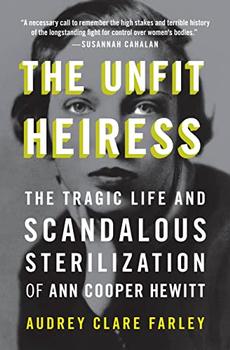Summary | Excerpt | Reviews | Beyond the Book | Readalikes | Genres & Themes | Author Bio

The Tragic Life and Scandalous Sterilization of Ann Cooper Hewitt
by Audrey Farley
After her discharge, she went home and was kept a prisoner in her room. "My mother made me act as my own maid," Ann claimed. "Not one housekeeper entered my room during my convalescence. I was forced to live with little more than the bare necessities or comforts of a poorhouse waif."
When a reporter asked what she meant by the second statement, Ann explained that the telephone and reading lamp had been removed from her room. She couldn't communicate with anyone or even read the newspaper after dusk—not that one had been delivered to her. At mealtime, she'd hear a knock at the door and open it to find a maid holding some paltry, unappealing dish. Perhaps a biscuit without butter or jam, or a cold leg of chicken with a few lifeless spears of asparagus. The maid would wait for her to take the plate and then re-lock the door behind her.
The reporter hurried to record these details. Only in fiction did people encounter little rich girls imprisoned and made to live a miserly existence.
The Little Princess treatment was not new, the young heiress told reporters. "I was locked up all the time," she said. "In fact, as a baby, I was put in a crib with very tall sides. That was so I couldn't climb out of it. We were living in Paris then." The heiress recalled how her father, who was not yet married to her mother at the time, would visit the apartment and pick her up. "He was the only one who ever let me out of that cage. My mother never came near me. The maid would come and dress me in the morning, then leave me there for the day. I would often go to sleep in my clothes."
"So you remember your father?" one journalist inquired. "What was he like?"
"I remember my father very well," said Ann. "He was one of the few precious gifts of my life. He was a tall man, very kind and gentle. I think of him walking beside me, suiting his long gait to mine. It seems to me I spent all my happy times with him. He died when I was seven."
After her father's death, Ann related, she hardly ever left their apartment. She was forbidden from making friends or having boyfriends when she grew older. "Mother didn't have one spark of affection for me, and she refused to permit others who did. She always called me an 'imbecile' and an 'ugly duckling.' She hated my buck teeth and my humped shoulders. And the way my eyes cross when I am tired. She sometimes struck me when she noticed my eyes were going."
The reporters looked around in disbelief. They knew wealthy women weren't keen on parenting, but Ann's claims were truly extraordinary. What would Maryon have to say for herself?
Ann revealed a small scar on her forehead, where she claimed to have been cut with a wineglass. She said her mother had smashed a glass of Cabernet over her head one evening, when a gentleman did not appear for a dinner date with the two of them. "She blamed me whenever things didn't work out with a man."
The slight, ninety-pound heiress also revealed a burn on her forearm, where she claimed her mother had extinguished a cigarette. "That was for telling her I didn't like one of her suitors."
Even had it not been for Ann's claims of abuse, some present might have turned against her mother, believing that female smoking was a sign of modern women's depravity. Men could withstand the habit; but in women's bodies, cigarette smoke compromised judgment, inflamed the imagination, and unleashed all sorts of profane desires. Women knew this and still puffed away.
Ann contended that, for many years of her life, she didn't realize that her situation was extraordinary. "I thought all mothers treated their daughters the way mine treated me. Until I went to school, I thought that was the usual way people behaved."
"You mean you've never had anyone else to love you? Besides your father?" a reporter asked.
"Well, most of the men my mother married were kind to me. I suppose that's one of the few things she has done for me—seen that I had nice stepfathers," said Ann. "I've also had a few people paid to take care of me who were kind. I did have this one maid, Nini, who was especially affectionate. My father hired her. She was there the night he died and comforted me when Mother sent me away from his bed."
Excerpted from The Unfit Heiress by Audrey Farley. Copyright © 2021 by Audrey Farley. Excerpted by permission of Grand Central Publishing. All rights reserved. No part of this excerpt may be reproduced or reprinted without permission in writing from the publisher.
If you want to build a ship, don't drum up people... but rather teach them to long for the endless immensity of the...
Click Here to find out who said this, as well as discovering other famous literary quotes!
Your guide toexceptional books
BookBrowse seeks out and recommends the best in contemporary fiction and nonfiction—books that not only engage and entertain but also deepen our understanding of ourselves and the world around us.